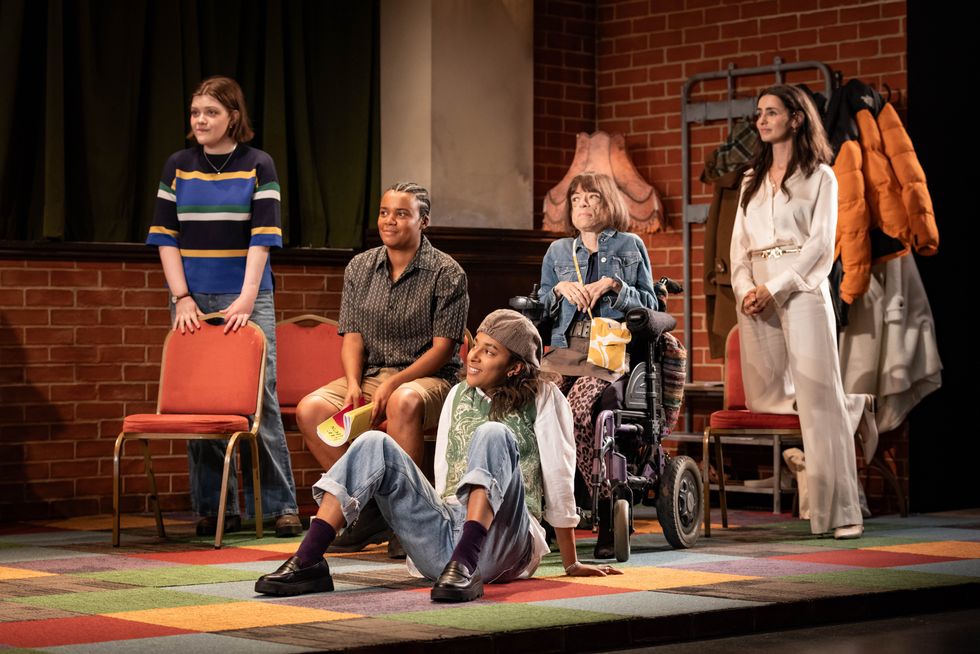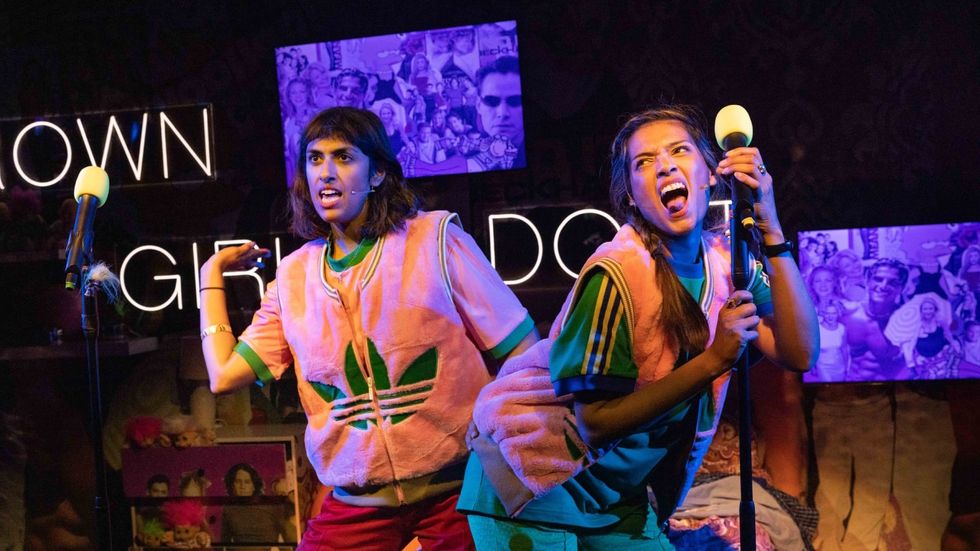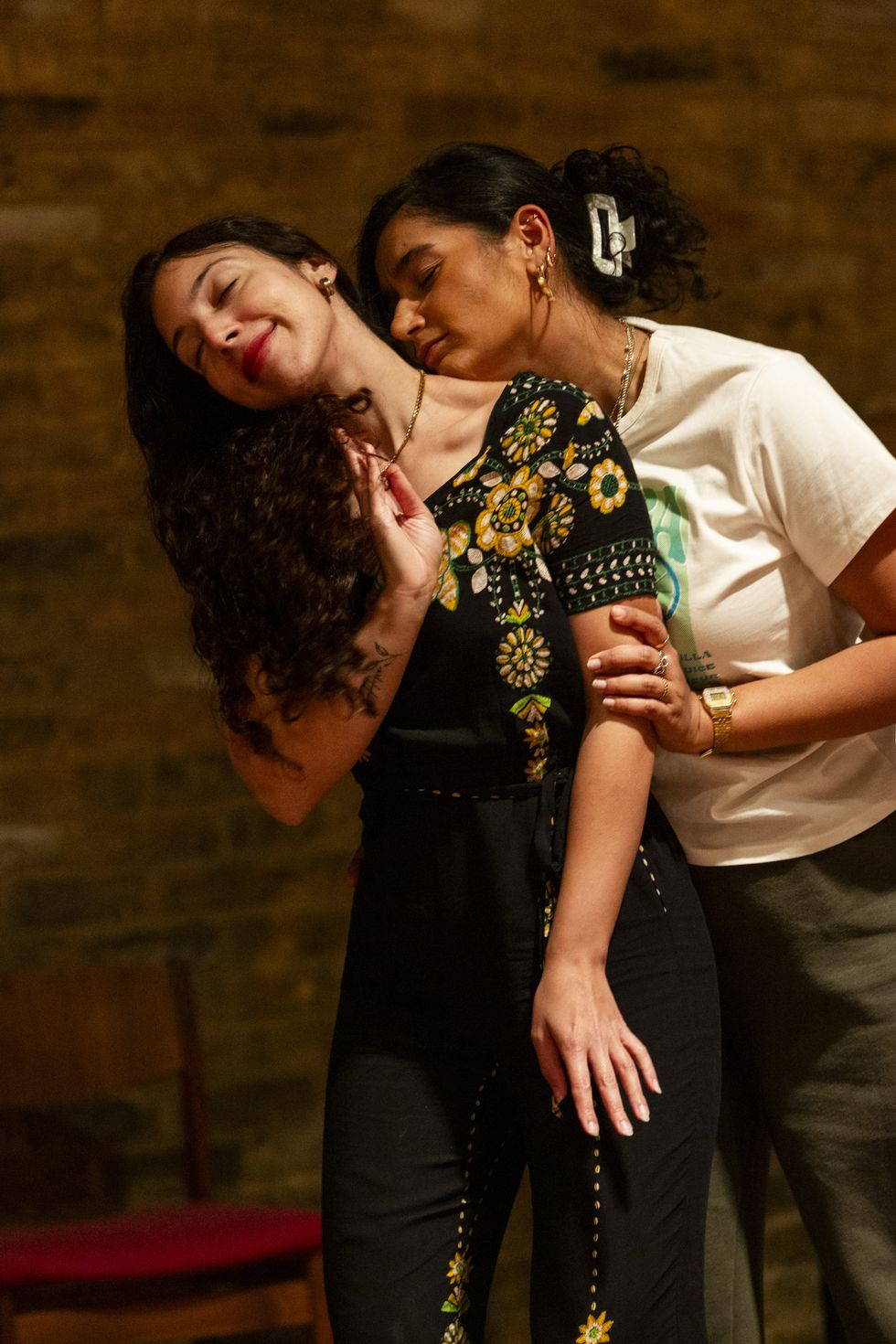A NEW play explores anger through the lens of being both south Asian and British, its Asian director has said.
Speed, directed by Milli Bhatia opened at Bush Theatre last Friday (4). It is written by Mohamed Zain Dada (Zain), and the cast includes Nikesh Patel, Arian Nik, Shazia Nicholls and Sabrina Sandhu.
Set in a Birmingham hotel basement, it tells the story of a nurse, a delivery driver and an entrepreneur who attend a speed awareness course.
In an interview with Eastern Eye, Bhatia said, “The play follows three participants and a facilitator.
“It is a new scheme being trialled by the Driver and Vehicle Licensing Agency (DVLA), combining different methods to rehabilitate individuals who drive at excessive speeds or have been involved in road altercations. The programme is specifically tailored as a speed awareness course for aggressive drivers.
“The play raises intriguing questions about British stoicism, particularly the idea of keeping calm and carrying on, and what that means for second- and third-generation British south Asians today, especially in the wake of race riots.”
She added, “It explores the themes of racing culture, car culture, and our community’s relationship with cars.
“During our research, we have been looking at Zimmers of Southall, a photography book by Hark Karan, which celebrates our community and its deep connection with cars in this country. We also drew inspiration from [Turner Prize winner] Jasleen Kaur’s recent exhibition at Tate, which includes an installation of a car with a giant doily on it. I interpreted it as a beautiful symbol of first-generation migrants acquiring their own cars and the care they place in them.
“Through this process, we have deeply examined car culture and how it specifically relates to our community — this is very much reflected in the play.”
Bhatia said Speed poses important questions about how we are permitted to express anger, and the extent to which we suppress it to avoid being misinterpreted or judged. She added, “Zain, the writer, was inspired by his own experience of attending a speed awareness course. He was fascinated by the dramatic potential of strangers coming together in a room, wanting to present themselves in a certain way while also being exposed to situations that make them feel vulnerable.

“The play isn’t directly about this, but many of us have been reflecting on how much permission we feel to express ourselves, particularly after last summer’s race riots [after the Southport killings]. There was horrific footage of south Asian men simply walking down the street and being attacked for being there. That was terrifying for us.
“We are all very aware of what previous generations of Indians in this country endured. We’ve spoken to our parents and grandparents about the National Front, the Southall riots, and the incredible resistance movements they were part of – things that aren’t widely celebrated or discussed. That’s why Defiance, the Channel 4 series, felt like such an important moment in acknowledging our history of protest.
“After the race riots, we gained a new perspective on what our parents and grandparents had told us. We experienced real fear, which made us question anger – where it goes, how much of it we’re allowed to express. That context made the play feel dramatically compelling.”
Bhatia said she hoped south Asians who come to watch that play will experience that same sense of recognition as Speed poses “meaningful questions for them”.
“At its core, however, Speed focuses on speeding and aggressive driving. Applying this issue to the south Asian community, and particularly to our generation, is fascinating. We are often referred to as the angry generation, and the facilitator in the play frequently references academic discussions on anger.
“[Roman philosopher] Seneca, for instance, viewed anger as a useless emotion. However, I was recently listening to Gabor Maté, Canadian physician and author, who argues that anger is essential for survival. This theme feels particularly poignant now, considering that only last summer, south Asians were attacked simply for their visibility. Looking at how earlier generations navigated these issues has been as crucial as examining what it means for us today.”
Bhatia has been nominated twice for the Olivier Awards for Seven Methods of Killing Kylie Jenner and Blue Mist.
A former associate director at the Royal Court Theatre, she has worked with leading theatres across the UK and internationally, with productions staged in the West End, New York, and Sweden.
Describing her journey in the arts, she said, “I always knew I wanted to be a storyteller, and I was lucky to grow up in a home where my parents [actress Meera Syal and her former husband, the journalist Shekhar Bhatia] and grandparents actively encouraged that.
“I started directing at university when I was 18, though it wasn’t something I initially planned to do. I was studying drama and English, and I knew I wanted to work in the arts, but I wasn’t sure in what capacity.”
“At one point, I thought I might become an actor, but I was also volunteering at a women’s refuge at the time. I had done so in London, and when I moved to Norwich for university, I continued volunteering. They asked me to organise a fundraiser, and I agreed. Since I was in the drama department and had access to brilliant actors and resources, I decided to put on a play. That was the first play I ever directed, at 18.
“Six years later, I was directing at the Royal Court. It was quite a rapid trajectory. I quickly realised how much I loved collaboration in theatre. Directing allowed me to focus on two things I really cared about: political themes (since the play supported the refuge) and working with an all-female cast for that project.”
Bhatia said she was moved by a play by South African playwright Yael Farber called Nirbhaya, which was based on the Delhi gang rape incident. Even now, years later, I think about that play. It opened my eyes to what theatre could be and who it could be about. It profoundly moved me, she said.
She said she feels creatively fulfilled by making work that explores big questions about south Asians, their place in the world, and the challenges they face.







 Jamie Lloyd’s Evita with Rachel Zegler set for Broadway after London triumphInstagram/
Jamie Lloyd’s Evita with Rachel Zegler set for Broadway after London triumphInstagram/









 Lunchbox is a powerful one-woman show that tackles themes of identity, race, bullying and belongingInstagram/ lubnakerr
Lunchbox is a powerful one-woman show that tackles themes of identity, race, bullying and belongingInstagram/ lubnakerr She says, ''do not assume you know what is going on in people’s lives behind closed doors''Instagram/ lubnakerr
She says, ''do not assume you know what is going on in people’s lives behind closed doors''Instagram/ lubnakerr
 The crew of The Ministry of Lesbian Affairs
The crew of The Ministry of Lesbian Affairs
 It is rare to witness a show that is both this hilarious and this importantAMG
It is rare to witness a show that is both this hilarious and this importantAMG
 Hunia Chawla
Hunia Chawla A still from rehearsal
A still from rehearsal